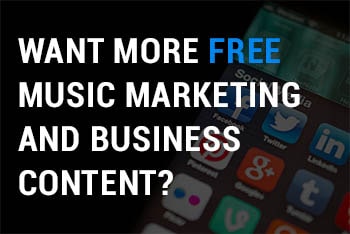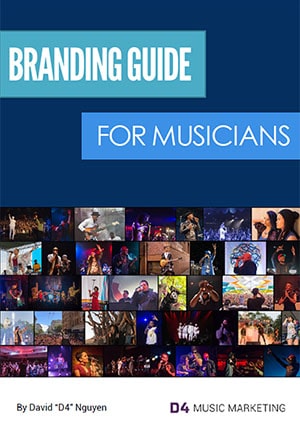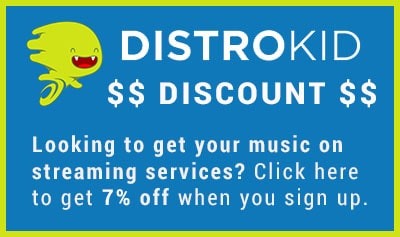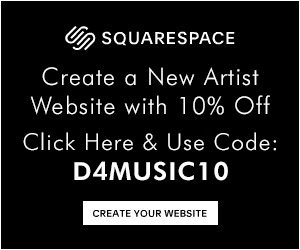
Your online presence plays a major role in promoting your music and cultivating a fanbase as an independent artist. It’s great that the Internet has leveled the playing field for musicians to be seen and heard by anyone in the world. The problem is that many artists out there are making the same online mistakes that limit their potential and make it harder to grow a fanbase. With so much competition for attention, you can’t afford to make these mistakes if you want to maximize your chances of making it as an independent.
Instead of just pointing out the common online marketing mistakes in this blog, I want to provide some guidance on how to address those issues as well. You have to remember that your online presence and foundation should make your marketing efforts more efficient and not waste time.
1. No Website
It’s 2016. There’s no reason or excuse to not have a website that serves as the central place for your music and online presence. Especially if you are serious about making a living as a musician, you need a website to demonstrate your legitimacy as an artist.
If you can’t afford to pay someone for a professionally created site, there are some free/cheap template-based options available that you can do yourself. Services like Wix and Squarespace offer some great templates for music artists. You should be able to put together your own site with a custom domain URL for about $100 – $150 a year.
There are some artists that think having social media is all you really need. First, I would say you shouldn’t depend on only social media because you don’t have full control of what goes on in those platforms. You want to have your own online property that you can tell your story the way you want without the distractions. It may not seem like it, but the relationships you have with fans and followers on social media don’t actually belong to you. If something were to happen to the platform or your account, it won’t be easy to reconnect with them again.
This is why you need to collect emails, which leads to the next common mistake.
2. Not Capturing Emails
With so much emphasis on social media, capturing emails can get lost as a priority. It’s easy for artists to get caught up in the vanity metrics and overvalue social likes and followers. However, don’t underestimate the power of an email list. Studies have shown that directly emailing subscribers email is a stronger influence to getting people to buy than any other online marketing channels, and we all know artists want to get paid. Best of all, an email list is something you own that allows you to reach fans directly.
This is not to say social media isn’t important, because it certainly is. It just serves a different purpose in marketing. The main point is you want to own the relationships you have with your fans so you are not dependent on social media platforms you have little control over. Ultimately, your email list is the key to keep you in the long term game and make a living off being a musician.
3. Thinking Sales Too Early and Too Often
A common mistake for music artists is thinking too transactionally and not focusing on long term branding. Thinking transactionally means you are prioritizing monetary gain over deepening the relationships with fans. This is not to say you can’t make a living off of music, but it’s a short term approach that limits your ability to sustain a long-lasting career.
This transactional mindset is a problem in how it influences your business decisions. You try to record a product to monetize before you even establish an audience. That is a huge mistake, especially in this day in age where there’s an oversaturation of free music. Another scenario is being too pushy or salesman-like with your music promotion. If you haven’t established a name for yourself, you can’t expect people to pour out money to buy your record. You got to prove your value first to a group of people, and that can take some time.
I understand that the dream is to make a living off music so you can quit that day job you hate so much. If you’re just thinking of making money straight out the gate, you’re not going to last. There’s just way too much competition for attention and music to expect people to pay for discovery. Let go of this traditional mindset in music that I feel is no longer relevant in today’s society.
4. No Understanding of Branding
This is a big one. Since there’s such a low barrier for entry into music, you have an oversaturation of independent musicians all fighting for attention. It’s simply not enough to be talented or have “good” music anymore. A common problem I’ve seen is an artist who can really sing or rap, but nothing else stands out. Unfortunately, history has proven that being the most talented or technically sound is not always the key to success.
There’s gotta be something you can strategically highlight about yourself online, whether through your music or presentation. This is where understanding your brand comes in. Sure, you can turn some heads with great talent. But remember the indie game is a long term game so you need strong branding that can take you the distance.
How to Fix: Do a self-assessment and be honest with yourself. Start by asking yourself these questions:
- What do you stand for as an individual or as an artist?
- What do you hope to accomplish through your music?
- What makes you different from other artists that you feel are similar to you?
- How do you want people to remember you as an artist?
- What are common themes in your music?
- What’s your story or message?
Based on your answers, focus in on a target market and position your brand to attract those people. For more, you can read my blog on 6 branding myths you need to ignore. Also check out Branding for Musicians.
5. No Website Analytics
Google has a free service called Google Analytics that is relatively easy to install and offers tons of valuable web traffic data about your website. You may not be able to decipher and make sense of all of that data yourself BUT at least having it on allows you to collect the data so it can be used later.
Here is some basic information you can learn:
- Are people even visiting your website?
- Demographics of your website visitors
- Potential issues with the website that cause visitors to leave early
- What social media channel is driving the most traffic? This way you can focus on what is working well.
6. Not Engaging with Your Online Audience
If a fan or someone who likes your music takes the time to reach out to you, you need to respond and engage with them. This is particularly true earlier on as you should have the time to develop those relationships. Remember this is a long term game so actions like this help to build a stronger brand.
7. No Consistency with Online Content
As you know, there’s so much to do and see on the Internet that it can be easy to lose the attention of your fans. Of course, this doesn’t mean you need to be posting on social media or sending emails every day. You should at least post with some regularity and even let your fans know if you are gone for extended periods of time. Part of the responsibility with building an online audience is providing value and carrying that momentum with consistency.
You can also extend this mistake to the type of content that gets posted on social media. You don’t want to be all over the place with topics not relevant to your brand or music. It’s okay to share parts of your personal life but remember it’s mainly about the music.
8. Spending Time On Too Many Social Media Channels
I know it sounds counter-intuitive but it’s true. You want to maximize your exposure so you try to be active on every social media channel. Chances are you will be spreading yourself too thin and not getting the full effect of one strong audience. You should still sign up for all the social media accounts so others can’t take your handle, but just don’t go posting on all of them. Your time as an independent artist is valuable so it’s best to be strategic about it.
Don’t spend too much time on social media that it takes away from in-person promoting, creating new music, or performing live. Music is all about building connections, and real-life connections are the most essential. Nothing is more memorable than doing great live shows and engaging fans in person. Work to keep your social updates in balance with your in-person events and music creation.
Another related problem is spending too much time on social media that it takes away from making music or building real-life connections. Nothing is more memorable than doing great live shows and engaging fans in person. Sure, there are limitless amounts of potential fans on the Internet, but I believe you can make stronger connections with human interactions.
9. No Online Marketing Plan or Set Goals
When you don’t have a plan to keep you on track, it’s easy to get lost or waste time with your online marketing efforts without even realizing it. As an indie artist, you can’t afford to use your time inefficiently. Making it as an independent is hard work, but you also have to be smart about it. This means you need to know how to manage your time, but also need to have some understanding of branding and marketing.
10. Lack of Patience
Although this is a more general problem for independent artists, a lack of patience can be reflected in how you conduct yourself online. It’s what drives people to think more transactionally and be pushier with how they promote their music. Impatient artists will spam their songs to every site, blog, forum and social media outlet in existence. I get that persistence is a good thing but there’s a right and wrong way to go about it. Acting like an annoying used car salesman is the best way to get ignored.







